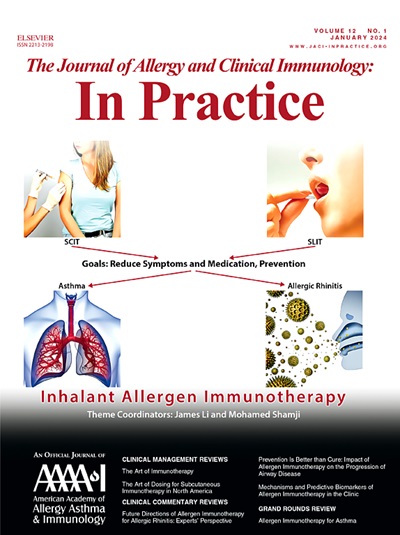促进食物过敏公平的战略方向:CFAAR促进食物过敏公平峰会的要点。
IF 6.6
1区 医学
Q1 ALLERGY
Journal of Allergy and Clinical Immunology-In Practice
Pub Date : 2025-09-01
DOI:10.1016/j.jaip.2025.05.024
引用次数: 0
摘要
在美国,食物过敏(FA)影响了大约10.6%的成年人和7.6%的儿童,总计超过3000万人。除了医学上的影响,FA给个人、家庭和照顾者带来了巨大的情感、社会和经济负担。在FA教育和获得临床护理方面的差异已经在社会经济和种族群体中被发现。为了确定和解决食物过敏公平的障碍,西北大学食物过敏和哮喘研究中心主办了促进食物过敏公平峰会(SAEFA),该会议汇集了35位领先的专家作为小组成员和50多名不同的食物过敏利益相关者,讨论了四个关键的食物过敏小组:日常生活、诊断、预防和日常治疗。抄写员对讨论进行实时转录,并将笔记实时投影到会议室前面,使与会者能够积极地回顾、贡献,并随着对话的发展而改进见解。SAEFA会议的结果为促进该领域的公平制定了5个战略方向:(1)加强公共场所的食物过敏安全;(2)扩大社区卫生倡议;(3)增加过敏护理的公平获取;(4)加强行业合作和政策改革;(5)推动研究创新。SAEFA会议的结果有助于阐明如何解决FA不平等问题需要一个全面的,多部门的方法。实施扩大医疗服务可及性、改善患者教育和促进包容性政策的战略,同时借鉴医疗保健其他领域的成功模式,可以推动在改善FA管理公平性方面取得有意义的进展。本文章由计算机程序翻译,如有差异,请以英文原文为准。
Strategic Directions for Advancing Equity in Food Allergy: Takeaways From CFAAR’s Summit for Advancing Equity in Food Allergy
In the United States, food allergy (FA) affects an estimated 10.6% of adults and 7.6% of children, totaling over 30 million individuals. Beyond their medical implications, FA places a substantial emotional, social, and economic burden on individuals, families, and caregivers. Disparities in FA education and access to clinical care have been found across socioeconomic and racial groups. To identify and address barriers to equity in FA, Northwestern’s Center for Food Allergy and Asthma Research hosted the Summit for Advancing Equity in Food Allergy (SAEFA), a conference bringing together 35 leading experts as panelists and over 5 dozen diverse FA stakeholders for 4 key FA panels: daily life, diagnosis, prevention, and daily treatment. Live transcription of the discussions by scribes and real-time projection of notes to the front of the conference room allowed attendees to actively review, contribute to, and refine insights as conversations evolved. The results from the SAEFA conference led to the creation of 5 strategic directions for advancing equity in the field: (1) enhance food allergy safety in public spaces, (2) expand community-based health initiatives, (3) increase equitable access to allergy care, (4) strengthen industry collaboration and policy reform, and (5) drive research innovation. Results from the SAEFA conference help underscore how tackling FA inequalities demands a comprehensive, multisector approach. Implementing strategies to expand access to care, patient education, and public awareness, while drawing from previously successful models and intiatives from other medical fields, can drive meaningful progress in advancing equity in the field of FA.
求助全文
通过发布文献求助,成功后即可免费获取论文全文。
去求助
来源期刊

Journal of Allergy and Clinical Immunology-In Practice
ALLERGYIMMUNOLOGY-IMMUNOLOGY
CiteScore
11.10
自引率
9.60%
发文量
683
审稿时长
50 days
期刊介绍:
JACI: In Practice is an official publication of the American Academy of Allergy, Asthma & Immunology (AAAAI). It is a companion title to The Journal of Allergy and Clinical Immunology, and it aims to provide timely clinical papers, case reports, and management recommendations to clinical allergists and other physicians dealing with allergic and immunologic diseases in their practice. The mission of JACI: In Practice is to offer valid and impactful information that supports evidence-based clinical decisions in the diagnosis and management of asthma, allergies, immunologic conditions, and related diseases.
This journal publishes articles on various conditions treated by allergist-immunologists, including food allergy, respiratory disorders (such as asthma, rhinitis, nasal polyps, sinusitis, cough, ABPA, and hypersensitivity pneumonitis), drug allergy, insect sting allergy, anaphylaxis, dermatologic disorders (such as atopic dermatitis, contact dermatitis, urticaria, angioedema, and HAE), immunodeficiency, autoinflammatory syndromes, eosinophilic disorders, and mast cell disorders.
The focus of the journal is on providing cutting-edge clinical information that practitioners can use in their everyday practice or to acquire new knowledge and skills for the benefit of their patients. However, mechanistic or translational studies without immediate or near future clinical relevance, as well as animal studies, are not within the scope of the journal.
 求助内容:
求助内容: 应助结果提醒方式:
应助结果提醒方式:


